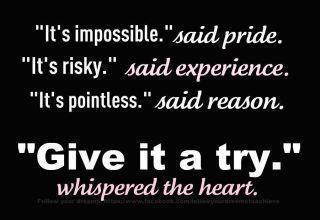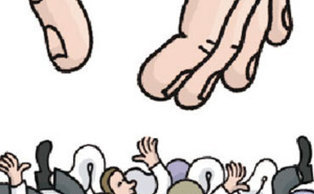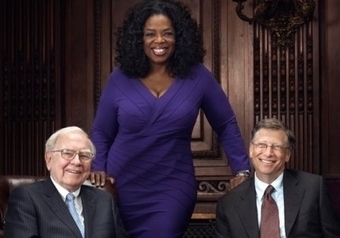 Your new post is loading...
 Your new post is loading...

|
Scooped by
Barry Deutsch
January 27, 2014 2:34 PM
|
Curation in an of itself can be a solitary activity - unless learners connect with their Personal Learning Network (PLN). HR leaders can develop a continuous learning organization by connecting curation with PLN.

|
Scooped by
Barry Deutsch
May 28, 2013 12:37 PM
|
Hiring The Wrong Salesperson? What Is The Cost? Avoid The 3 Major Mistakes!

|
Scooped by
Barry Deutsch
May 28, 2013 12:22 PM
|
Just like back in the schoolyard, a workplace bully can terrorize the people around them.

|
Scooped by
Barry Deutsch
May 28, 2013 12:04 PM
|
So, what should line managers - who are coming through the ranks - do to avoid the 'traps' of poor management?

|
Scooped by
Barry Deutsch
February 24, 2013 1:34 PM
|
Boston Consulting Group issued a new report about debunking the myths of the first 100 days. It is worth reading if you are a new CEO. Several facts are worth

|
Rescooped by
Barry Deutsch
from #BetterLeadership
January 7, 2013 2:23 PM
|
..."Manage your own behavior first. Many managers try to control others’ behavior by being coercive, manipulative or demanding. Control your impulses, take responsibility for your actions, and be adaptable. If you aren’t a responsible leader, don’t expect employees to shoulder the responsibility for making your business a success."
Via AlGonzalezinfo
Learn how to dramatically improve your business by determining which of these vital four factors is most in need of repair
Via Mark Taylor

|
Scooped by
Barry Deutsch
December 18, 2012 10:18 PM
|
How to know if your organizational culture is turning toxic, and what to do about it.

|
Scooped by
Barry Deutsch
November 25, 2012 4:13 PM
|
"5 Myths Of Human Capital Management. HR is one of those fields where numerous myths endure."
Good article on the Forbes website about "myths" of hiring and managing employees. Does your organization fall victim to these "myths". Do you have your own set of tribal "myths" and "activities" that have built up over the years - but you know are counter-productive?
How do you break these "myths?" Are they reinforced through human resources or hiring managers? Do you need more training in effective human capital management OR do you need to replace some of the people in charge of it?
Barry Deutsch Leadership Blog for CEOs and Senior Executives in the Vistage and TEC Community http://www.impacthiringsolutions.com/vistageleadershipcommunity
If your passion is focused on being the best leader possible, join us in our LinkedIn Discussion Group for leadership topics ranging from hiring and retaining top talent to outstanding sales management http://www.linkedin.com/groups/IMPACT-Hiring-Solutions-Leadership-Management-1925834/about

|
Scooped by
Barry Deutsch
November 3, 2012 9:03 PM
|
If you want to be a CEO, it's time to make sure your resume includes this phrase: "extensive downsizing experience." Ford Motor Co. yesterday named Mark Fields its new chief operating officer.
What a depressing perspective on the role of being a CEO. Of course, downsizing might the part of any CEO role when restructuring or bad times hit. However, you would think someone at the pinnacle of corporate leadership would have a more positive perspective on leading, engaging employees, or providing value to customers?
What do you think? Was the comment on the mark or way off base?
Barry Deutsch Partner IMPACT Hiring Solutions Hire and Retain Blog
Do you have a FREE Copy of our best selling ebook on how to hire top talent?

|
Scooped by
Barry Deutsch
November 3, 2012 2:34 PM
|
Bullying is in the eye of the beholder, at least for the time being, in this country. There is no national definition of bullying or non-sexual harassment behaviour in law at present.
Where does the gap occur between what a manager considers performance management and constructive feedback and the employee considers bullying?
Do you teach your managers the difference betweent he two. Just because they carry the title of "manager" doesn't correlate with their ability to conduct effective performance management.
Barry Deutsch Partner IMPACT Hiring Solutions HIRE and RETAIN Blog
Do you have a FREE Copy of our best selling ebook on how to hire top talent?

|
Rescooped by
Barry Deutsch
from #BetterLeadership
October 18, 2012 11:42 PM
|
Losing $400,000 a Month! The result of this one man’s mismanagement was staggering: The facility began to decline and after 3 months it was in the red to the tune of $400,000.
I've found that most small businesses and entrepreneurial companies invest very little resources in management and leadership training. Not only do top performers demand a large amount of training and development, study after study has shown that investing in training yields returns far greater than the initial training investment.
What percentage of your sales do you invest in training and development?
Barry Deutsch http://www.barrydeutsch.net
Via AlGonzalezinfo

|
Scooped by
Barry Deutsch
October 9, 2012 8:45 AM
|
Most of us have worked for leaders that are for all intents and purposes were not very good. I have worked with and for both great leaders and those not very good leaders. To be honest, I actually learned a lot in my early days of leadership from some really bad leaders. Not only were they bad leaders, they were oblivious to the negative affects of their poor leadership. There are many signs that a leader is not a good leader and below are 12 Obvious Signs. The reason I attribute these signs to not being a ”Good Leader” instead of “Great Leader,” is due to the fact that a leader usually goes through the progression of being a “Good Leader” before they can become a “Great Leader.”
|

|
Scooped by
Barry Deutsch
June 18, 2013 10:05 PM
|

|
Scooped by
Barry Deutsch
May 28, 2013 12:28 PM
|
A survey of revealed that one in four employers is struggling to fill vacancies.

|
Scooped by
Barry Deutsch
May 28, 2013 12:14 PM
|
Usually, employers rapidly scan the resume of each job applicant looking for relevant education, skills, and work experience.

|
Scooped by
Barry Deutsch
April 7, 2013 2:55 PM
|
Simon Sinek speaks about leadership and the four chemicals that dictate office behavior at the 2013 Vistage Think BIG Conference. He was great!
Via Mark Taylor

|
Scooped by
Barry Deutsch
December 27, 2012 8:18 PM
|
Let's cut to the chase: If the only feedback your employees get from you is in the form of a 6- or 12-month performance review, it’s time to change your approach to feedback.

|
Scooped by
Barry Deutsch
December 24, 2012 11:57 AM
|
"The founder of Shake Shake and Union Square Cafe talks about how to respond when an employee screws up"

|
Scooped by
Barry Deutsch
December 18, 2012 9:21 PM
|
Innovation is nothing more than a tool that enables companies to achieve unique, strategic goals. It should not simply be a slogan, nor an end unto itself, argues Jeffrey Baumgartner.

|
Scooped by
Barry Deutsch
November 14, 2012 7:42 PM
|
Great advice on transitioning into the role of CEO.
I liked this list of bullet points Marv Howard laid out in his post on the Vistage Baltimore site about stepping into the role of CEO. In our executive search practice and hiring consulting we've seen many CEOs and senior executives fail in their first 6-12 months for the issues Marv described in this article.
A good checklist if you're stepping into the role of CEO or your still on your honeymoon with a new company.
Barry Deutsch

|
Scooped by
Barry Deutsch
November 3, 2012 8:05 PM
|

|
Rescooped by
Barry Deutsch
from #BetterLeadership
October 18, 2012 11:47 PM
|
For the past 20 years, I’ve taught aspiring young business leaders at Stanford University’s Graduate School of Business. These ambitious future leaders – drawn from every race, religion, ethnicity and nationality -- spend two years in Palo Alto...
Here's my question about this "people" philosophy? Why do so many executives and CEOs give "lip service to the idea of "people are our greatest asset?" when the reality is that in most companies people are treated as expendable things.
Very few companies invest heavily in the acquisition and retention of top talent at all levels in the organization. Few managers are excited about the idea of interviewing and adding to their teams. There is very little training done to teach managers and executives how to hire and retain great employees.
Finally, very few bonus plans include specific elements for the ability to recruit and hire great performers. If people are not measured and rewarded, and there is no consequences for doing it poorly - why should managers and executives care about hiring and retention?
Barry Deutsch http://www.barrydeutsch.net
Via Metta Solutions, AlGonzalezinfo

|
Rescooped by
Barry Deutsch
from #BetterLeadership
October 17, 2012 8:37 AM
|
As you think about your goals, write them down. It may seem unnecessary, but it is a key element in acheiving goals. You may keep your written list of goals private, because they are designed to make you, as an individual, happy and successful. However, from a team perspective it may be important to share some of the goals to clearly give your team a vision.
Via AlGonzalezinfo
|






 Your new post is loading...
Your new post is loading...
























![Danny Meyer: What to Do When an Employee Screws Up [VIDEO] | What Do Great Leaders Do Differently? | Scoop.it](https://img.scoop.it/RRphj7-P2b-r8zZof75miDl72eJkfbmt4t8yenImKBVvK0kTmF0xjctABnaLJIm9)










